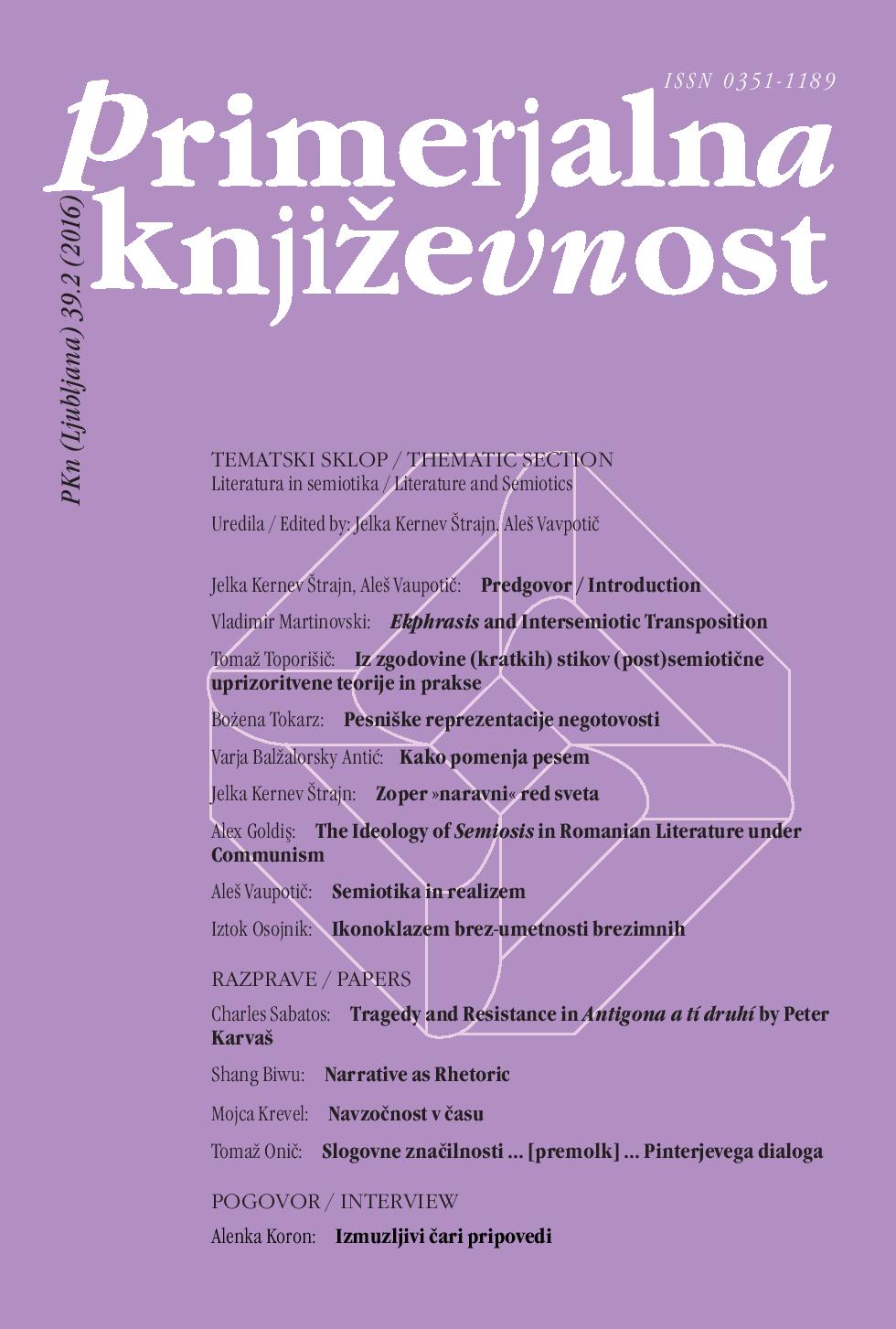How Does the Poem Signify: Benveniste, Meschonnic, Michaux
Keywords:
poetry, poetic discourse, significance, iconicity, rhythm, semantic prosody, poetic subject, Benveniste, Émile, Meschonnic, Henri, French poetry, MichauxAbstract
Émile Benveniste’s linguistics of discourse and Henri Meschonnic’s poetics of discourse both represent a critical alternative to the conception of the linguistic sign, such as the structuralists attributed to Saussure, and to the entire conceptual field that has derived from this understanding. It is well known that Benveniste grounded his theory of enunciation on the basis of the difference between the semantic and semiotic order. The fact that he was working on a theory of poetic language is less well known because his handwritten notes on this subject were published only in 2011. I briefly introduce some of his conceptual outlines connected to the “poetical practices of sign” that appear in his manuscript on Baudelaire. Their common denominator is the insight that the concept of the linguistic sign, as established by linguistics, does not suffice for research on poetic language. After this, I briefly address some of the key concepts of Henri Meschonnic’s poetics of discourse: generalized signifiance, a new understanding of rhythm, serial semantics, and recitative – which all deconstruct the linguistic sign. In the second part, I show the applied usefulness of these concepts by presenting the results of my close reading and analysis of Henri Michaux’s poem “La Ralentie” (“Woman in Slow Motion”).References
Balžalorsky Antić, Varja. »Elementi Benvenistove lingvistike izjavljanja in Meschonnicove poetike diskurza in njihov pomen za rekonceptualizacijo lirskega subjekta«. Primerjalna književnost 36.1 (2013): 253–275.
Balžalorsky, Varja. Lirski subjekt. Doktorska disertacija. Ljubljana: Filozofska fakulteta, 2009.
Benveniste, Émile. Baudelaire. Uredila in transkribirala Ch. Laplantine. Limoges: Lambert Lucas, 2011.
– – –. Problèmes de linguistique générale I. Pariz: Gallimard, 1972.
– – –. Problèmes de linguistique générale II. Pariz: Gallimard, 1974.
– – –. Problemi splošne lingvistike I. Prev. I. Žagar in B. Nežmah. Ljubljana: Studia humanitatis, 1988.
Dessons, Gérard. »Le Baudelaire de Benveniste entre stylistique et poétique«. Les notes manuscrites de Benveniste sur la langue de Baudelaire. Ur. Ch. Laplantine in J.-M. Adam. Semen. Revue sémio-linguistique des textes et discours 33 (2012): 55–70. Splet. 15. 2. 2016.
Laplantine, Chloé. »‘La langue de Baudelaire’, une culturologie«. Les notes manuscrites de Benveniste sur la langue de Baudelaire. Ur. Ch. Laplantine in J.-M. Adam. Semen. Revue sémio-linguistique des textes et discours 33 (2012): 71–90. Splet. 15. 2. 2016.
– – –. Émile Benveniste, l’inconscient et le poème. Limoges: Éditions Lambert Lucas, 2011.
Meschonnic, Henri. »La force dans le langage«. La force du langage. Rythme, discours, traduction. Autour de l’œuvre d’Henri Meschonnic. Ur. J. L. Chiss in G. Dessons. Pariz: Honoré Champion, 2000.
– – –. »Le sujet comme récitatif et le continu du langage«. Le Sujet lyrique en question. Bordeaux: Presses Universitaires de Bordeaux, 1996. 13–17.
– – –. »Seul comme Benveniste ou comment la critique manque de style«. Langages 29.118 (1995): 31–55.
– – –. Critique du rythme : anthropologie historique du langage. Lagrasse: Verdier, 1982.
– – –. États de la poétique. Pariz: PUF, 1985.
– – –. La rime et la vie. Pariz: Gallimard, 2006 (1989). (Folio essais)
– – –. Le Signe et le poème. Pariz: Gallimard, 1975.
– – –. Politique du rythme : politique du sujet. Lagrasse: Verdier, 1995.
– – –. Pour la poétique III. Une parole écriture. Pariz: Gallimard, 1973.
Michaux, Henri. Œuvres complètes I. Ur. R. Bellour z Y. Tran. Pariz: Gallimard, 1998.
Novak, Boris A. Zven in pomen. Študije o slovenskem pesniškem jeziku. Ljubljana: Znanstvenoraziskovalni inštitut filozofske fakultete, 2005.


